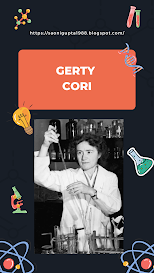Gerty Cori: A Woman in Science
Gerty Cori was a Czech-American biochemist who made groundbreaking discoveries in the field of carbohydrate metabolism, which earned her a Nobel Prize in Physiology or Medicine in 1947. She was the first woman to receive this honor, and her achievements paved the way for future generations of women in science. Her contributions to the field of biochemistry have had a lasting impact, but her legacy has often been overshadowed by that of her male colleagues. In this blog, I will explore the life and work of Gerty Cori and shed light on her remarkable achievements.
Early Life and Education
The Austro-Hungarian Empire still included Prague at the time of Gerty Theresa Radnitz's birth on August 15, 1896. Her father, Otto Radnitz, was a chemist, and her mother, Martha Wollman, was a pediatrician. They were both Jews and part of the city's intellectual and cultural elite.
Gerty was the youngest of three children in a Jewish family and grew up in a household that valued education and culture. She showed an early aptitude for science and mathematics from an early age and excelled in her studies.
However, as a woman, she faced many obstacles in pursuing a career in science. She was not allowed to attend a university in Prague, which did not admit women until 1897. So, instead of completing her secondary education, Gerty enrolled at the German University of Prague.
But she soon realized that her true passion lay in research, and she began to focus on biochemistry. In 1920, she received her doctorate in chemistry from the university, becoming the third woman to earn a doctorate in that field.
Career and Research
After completing her doctorate, Gerty began to work as an assistant in the biochemistry laboratory at the University of Vienna, where she met her future husband, Carl Ferdinand Cori. Carl was also a biochemist, and the two began to collaborate on research projects.
Together, they began studying carbohydrate metabolism, focusing on how glucose is broken down and used for energy in the body. They were married in 1924 and would go on to have a long and fruitful partnership in both their personal and professional lives.
In 1928, the Coris moved to the United States, where they took up positions at the Washington University School of Medicine in St. Louis, Missouri. It was here that they began the research that would eventually lead to their Nobel Prize-winning discovery.
The Coris were interested in the way that glucose, a simple sugar, is converted into glycogen, a complex carbohydrate that is stored in the liver and muscles for later use. They discovered that this process involves a series of enzyme-catalyzed reactions.
One of these enzymes, known as phosphorylase, plays a key role in breaking down glycogen, the storage form of glucose in the body, into glucose. They also discovered the Cori cycle, a process by which glucose is converted to lactic acid in the muscles and then transported to the liver, where it is converted back to glucose and stored as glycogen.
The Coris' research also showed that phosphorylase is regulated by a hormone called epinephrine, which is released by the adrenal gland in response to stress or danger. This discovery helped to explain how the body responds to stressful situations and was an important contribution to the field of endocrine.
Despite their groundbreaking discoveries, Gerty and Carl faced discrimination due to their Jewish heritage and were forced to flee Austria when the Nazis came to power in 1938. They moved to the United States, where they continued their research at Washington University in St. Louis.
In the 1940s, Gerty's research on carbohydrate metabolism led to the discovery of another enzyme, glucose-1-phosphate, which is involved in the synthesis of glycogen. This discovery earned Gerty and Carl the Nobel Prize in Physiology or Medicine in 1947, making Gerty the first woman to receive this honor.
Legacy and Impact
Gerty Cori's research on carbohydrate metabolism revolutionized our understanding of how the body uses and stores energy. Her work has had a profound impact on the fields of biochemistry and medicine, leading to the development of treatments for metabolic disorders such as diabetes and glycogen storage diseases.
However, despite her groundbreaking research and the recognition she received in her lifetime, Gerty's legacy has often been overlooked. She faced numerous obstacles in her career due to her gender and ethnicity and has frequently seen her male colleagues' achievements in science outshine her own contributions and achievements.
In recent years, efforts have been made to honor Gerty Cori's legacy and celebrate her achievements. In 2004, the U.S. Postal Service issued a stamp in her honor, and in 2020, a statue of Gerty and Carl Cori was unveiled in St. Louis. These tributes serve as a reminder of Gerty's remarkable contributions to science and the enduring impact of her work.
Conclusion
Gerty Cori's legacy extends beyond her scientific achievements. She was also an advocate for science education and worked to increase access to science education for women and underrepresented minorities. She believed that science should be accessible to everyone, regardless of their background or circumstances, and worked tirelessly to make this a reality. Today, Gerty Cori is remembered as a pioneering scientist, a trailblazer for women in science, and an advocate for science education. Her legacy continues to inspire future generations of scientists, and her contributions to science and society will be remembered for many years to come.







Very nice 👍
ReplyDeleteThank u so much!!!💖
Delete